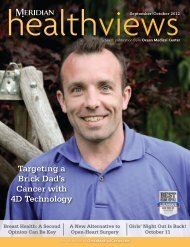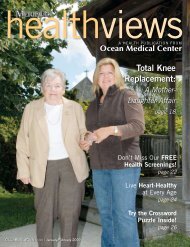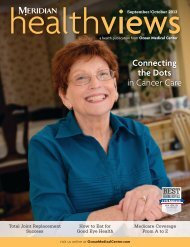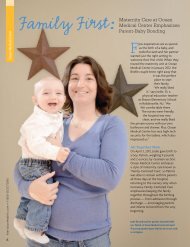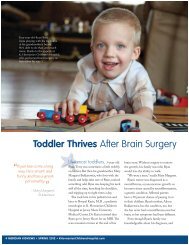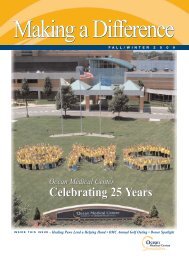page 8 - Ocean Medical Center
page 8 - Ocean Medical Center
page 8 - Ocean Medical Center
You also want an ePaper? Increase the reach of your titles
YUMPU automatically turns print PDFs into web optimized ePapers that Google loves.
Ask the Health Experts: Understanding Alzheimer’s<br />
Q: What is Alzheimer’s<br />
disease? If my mother or<br />
father had it, am I more<br />
likely to develop it?<br />
Alzheimer’s disease is an<br />
A: irreversible, progressive brain<br />
disease that slowly destroys memory<br />
and thinking skills. It can eventually<br />
destroy a person’s ability to carry out<br />
even simple tasks.<br />
Although the risk of developing<br />
Alzheimer’s increases with age, the<br />
disease is not a part of normal aging.<br />
“Alzheimer’s is associated with a<br />
buildup of plaque in the vessels of<br />
the brain,” says Neil Holland, M.D.,<br />
of Riverview <strong>Medical</strong> <strong>Center</strong>. “This<br />
buildup interferes with the brain’s nerve<br />
cells, called neurons. The neurons may<br />
stop working, lose connections with<br />
other neurons, and ultimately die.<br />
This destruction and death of neurons<br />
is what causes the memory failure,<br />
personality changes, problems in<br />
carrying out daily activities, and other<br />
features of Alzheimer’s.”<br />
The causes of Alzheimer’s are<br />
unknown, but genes may play a role.<br />
Scientists also continue to investigate<br />
how our lifestyle choices, such as our<br />
diets and exercise routines, affect our<br />
risk for Alzheimer’s.<br />
Q: The other day I simply<br />
could not remember<br />
the name of an actress<br />
in a movie I just saw. Are<br />
memory lapses like this<br />
normal? Or could it be a<br />
sign of Alzheimer’s?<br />
“A little memory blip is<br />
A: nothing to worry about,”<br />
says Benjamin Lessig, D.O., of<br />
<strong>Ocean</strong> <strong>Medical</strong> <strong>Center</strong>. “We all have<br />
them now and then, especially if<br />
we are stressed or sad. But some<br />
occurrences could signal a more<br />
serious memory problem.”<br />
These include:<br />
•Getting n lost in familiar places<br />
•Being n confused about time<br />
or money<br />
•Repeating n questions or phrases<br />
in the same conversation<br />
•Misplacing n items<br />
•Ignoring n personal hygiene<br />
•Forgetting n to eat<br />
If you’re concerned that<br />
memory problems are affecting<br />
you, see your doctor. Some types<br />
of memory problems can be<br />
slowed — or even stopped —<br />
with the right treatment.<br />
Q: My husband was<br />
recently diagnosed with<br />
Alzheimer’s. Do you have<br />
any tips to help me care<br />
for him?<br />
If you’re caring for someone with<br />
A: memory problems, the following<br />
recommendations from Alan Deutsch,<br />
D.O., of Jersey Shore University <strong>Medical</strong><br />
<strong>Center</strong> can help.<br />
•Be n flexible and patient.<br />
•Provide n verbal cues. For example,<br />
say: “This is Jane, your cousin, who<br />
has come to see you.”<br />
•Establish n a regular routine. A<br />
regular routine will make it easier<br />
to remember what usually happens<br />
during the day.<br />
•Learn n what to expect. For<br />
example, remind yourself that your<br />
loved one might not remember<br />
how to unload the dishwasher.<br />
It’s not that he doesn’t want to be<br />
helpful; it’s because of his disease.<br />
And don’t forget to seek help<br />
from family and friends. “Taking<br />
care of someone with Alzheimer’s<br />
disease requires that you take care<br />
of yourself,” says Dr. Deutsch. “It’s<br />
important to tap family, friends, and<br />
community resources to get a break.”<br />
Neil R. Holland, M.D.<br />
Board certified in Neurology<br />
West Long Branch | 732-935-1850<br />
Benjamin D. Lessig, D.O.<br />
Board certified in Geriatrics<br />
Toms River | 732-281-2700<br />
Alan D. Deutsch, D.O.<br />
Board certified in Neurology<br />
Neptune | 732-774-8282<br />
❯<br />
Do you have a general question about heart health for yourself<br />
or a loved one? If you need specific medical advice, please consult<br />
your own general practitioner, consultant, or nurse.<br />
The best general health questions come from you — and<br />
by asking them, you will be helping all our readers. Send us<br />
your question, and it may appear in an upcoming issue of<br />
Meridian HealthViews, answered by one of the experts at<br />
Meridian Health. When you submit a question, you will receive<br />
a FREE copy of our brochure Being Active for Life. Submit your<br />
question by e-mail to healthviews@meridianhealth.com or by<br />
mail to:<br />
Meridian Health, Attn.: Publications Manager<br />
1350 Campus Pkwy., Neptune, NJ 07753<br />
Please include your full name and mailing address so we can<br />
send you your brochure. We will use only your first name and<br />
city of residence in the publication.



